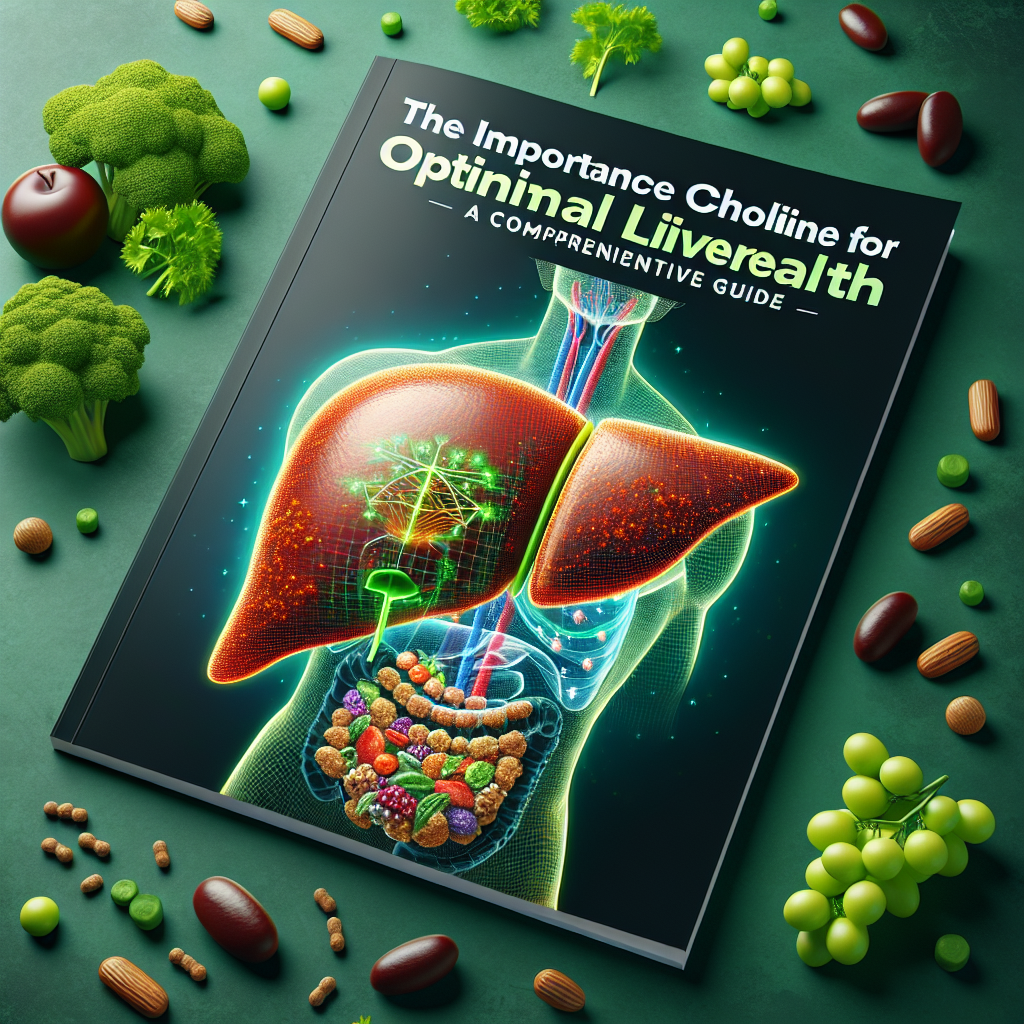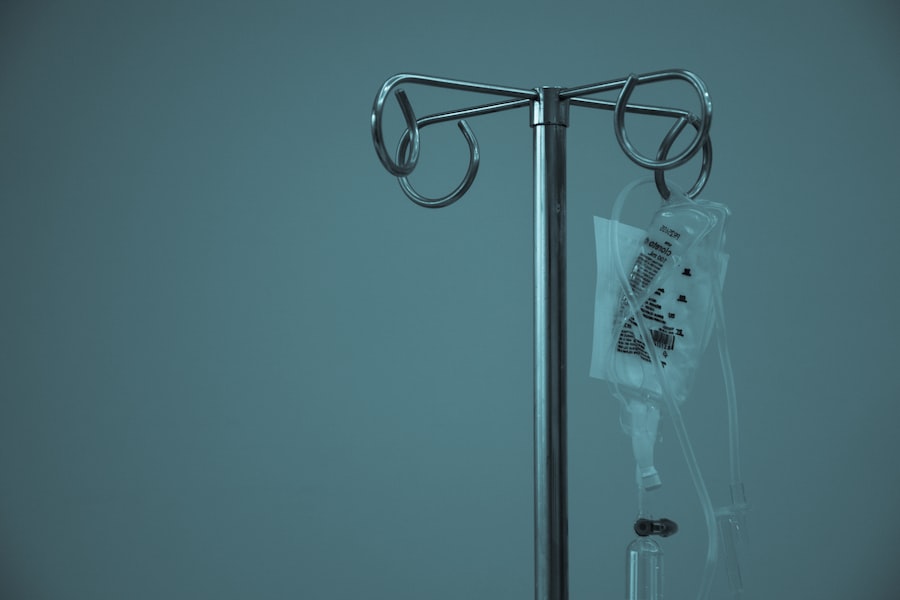The Importance of Choline for Optimal Liver Health: A Comprehensive Guide

Choline is an essential nutrient that plays a crucial role in liver health. It is a water-soluble vitamin-like substance that is necessary for various bodily functions, including liver function. Choline is involved in the synthesis of phospholipids, which are essential components of cell membranes. It also plays a role in fat metabolism and the transport of fats from the liver. In addition, choline is needed for the production of acetylcholine, a neurotransmitter that is important for brain function.
Key Takeaways
- Choline is an essential nutrient that plays a crucial role in liver health.
- Choline deficiency can have a negative impact on liver function and lead to liver diseases.
- Good dietary sources of choline include eggs, liver, and soybeans.
- The recommended daily intake of choline for optimal liver health is 550mg for men and 425mg for women.
- Choline supplementation may improve liver function and reduce the risk of liver diseases.
Understanding the Role of Choline in Liver Function
Choline supports liver function in several ways. Firstly, it is involved in the synthesis of phospholipids, which are essential for the structure and integrity of liver cell membranes. These membranes are responsible for regulating the flow of substances in and out of liver cells, as well as protecting the cells from damage.
Secondly, choline plays a key role in fat metabolism. It helps transport fats from the liver to other parts of the body for energy production or storage. Without adequate choline, fats can accumulate in the liver, leading to fatty liver disease.
Choline Deficiency and Its Impact on Liver Health
Choline deficiency can have a significant impact on liver health. When choline levels are low, fats can accumulate in the liver, leading to fatty liver disease. Fatty liver disease is characterized by an excessive buildup of fat in liver cells, which can impair liver function and lead to inflammation and scarring.
In addition to fatty liver disease, choline deficiency can also contribute to liver damage. Studies have shown that choline deficiency can lead to liver cell death and fibrosis, which can progress to more severe conditions such as cirrhosis and liver cancer.
Sources of Choline in the Diet
| Sources of Choline in the Diet | Choline Content (mg per 100g) |
|---|---|
| Egg yolk | 682 |
| Beef liver | 420 |
| Salmon | 56 |
| Chicken breast | 73 |
| Brussels sprouts | 63 |
| Broccoli | 63 |
| Peanuts | 70 |
Choline can be obtained from various food sources. Some of the best sources of choline include eggs, liver, beef, chicken, fish, and cruciferous vegetables such as broccoli and Brussels sprouts. Other good sources include peanuts, soybeans, and wheat germ.
To incorporate choline-rich foods into your diet, you can start by including eggs in your breakfast. Eggs are not only a good source of choline but also provide other essential nutrients. You can also include liver in your diet by adding it to stews or making pate. If you are a vegetarian or vegan, you can opt for plant-based sources of choline such as soybeans and cruciferous vegetables.
Recommended Daily Intake of Choline for Optimal Liver Health
The recommended daily intake of choline varies depending on age, sex, and life stage. For adult men, the recommended daily intake is 550 mg, while for adult women, it is 425 mg. Pregnant and breastfeeding women have higher requirements, with recommended daily intakes of 450 mg and 550 mg, respectively.
To meet the daily choline requirement through diet, it is important to include choline-rich foods in your meals. For example, a large egg contains about 147 mg of choline, while 3 ounces of beef liver provide around 356 mg. By incorporating a variety of choline-rich foods into your diet, you can ensure that you are meeting your daily choline needs.
Choline Supplementation and Its Effects on Liver Health

In some cases, it may be necessary to supplement with choline to meet the daily requirements for optimal liver health. Choline supplements are available in various forms, including choline bitartrate and phosphatidylcholine.
Choline supplementation has been shown to have potential benefits for liver health. Studies have found that choline supplementation can reduce liver fat accumulation and improve liver function in individuals with fatty liver disease. It may also help prevent liver damage and fibrosis in individuals with choline deficiency.
However, it is important to note that choline supplementation should be done under the guidance of a healthcare professional. High doses of choline can have side effects such as gastrointestinal distress and fishy body odor. It is also important to consider the potential risks and benefits of supplementation, as well as individual needs and health conditions.
Choline and Liver Diseases: Fatty Liver, Cirrhosis, and Liver Cancer
Choline has been studied for its potential role in preventing and treating various liver diseases. Research has shown that choline supplementation can reduce liver fat accumulation and improve liver function in individuals with fatty liver disease. It may also help prevent the progression of fatty liver disease to more severe conditions such as cirrhosis and liver cancer.
In addition to its role in fat metabolism, choline has been found to have anti-inflammatory and antioxidant properties, which can help protect the liver from damage. Studies have shown that choline supplementation can reduce inflammation and oxidative stress in the liver, which are key factors in the development of liver diseases.
Choline and Alcohol-Related Liver Damage
Alcohol consumption can deplete choline levels in the body, leading to choline deficiency. This is because alcohol interferes with the absorption and metabolism of choline. Chronic alcohol consumption can also impair liver function and lead to fatty liver disease.
Choline supplementation may help protect the liver from alcohol-related damage. Studies have shown that choline supplementation can reduce liver fat accumulation and improve liver function in individuals with alcoholic fatty liver disease. It may also help prevent the progression of alcoholic liver disease to more severe conditions such as cirrhosis.
Choline and Other Nutrients for Liver Health
In addition to choline, there are other nutrients that support liver health. Vitamin E is a powerful antioxidant that helps protect the liver from oxidative stress. Good sources of vitamin E include nuts, seeds, and vegetable oils.
Selenium is another important nutrient for liver health. It is involved in the production of antioxidant enzymes that help protect the liver from damage. Good sources of selenium include Brazil nuts, seafood, and whole grains.
To incorporate these nutrients into your diet, you can include foods such as nuts, seeds, seafood, and whole grains in your meals. It is important to have a balanced diet that includes a variety of nutrient-rich foods to support liver health.
The Importance of Choline for Maintaining Optimal Liver Function
In conclusion, choline plays a crucial role in liver health. It supports liver function by promoting the synthesis of phospholipids, which are essential for cell membrane structure. Choline also plays a key role in fat metabolism and the transport of fats from the liver.
Choline deficiency can have a significant impact on liver health, leading to fatty liver disease and liver damage. It is important to include choline-rich foods in your diet to meet the daily requirements for optimal liver function. In some cases, choline supplementation may be necessary under the guidance of a healthcare professional.
Choline has been studied for its potential benefits in preventing and treating various liver diseases, including fatty liver disease, cirrhosis, and liver cancer. It may also help protect the liver from alcohol-related damage. In addition to choline, other nutrients such as vitamin E and selenium are important for liver health and should be incorporated into a balanced diet.
Overall, maintaining optimal liver function is crucial for overall well-being. By understanding the importance of choline and incorporating choline-rich foods into your diet, you can support liver health and promote overall wellness.
For more information on the relationship between choline and liver health, check out this informative article on the Healthy Diet Doctor website: Choline and Liver Health Support. This article explores the benefits of choline for liver function and provides insights into how choline-rich foods can support a healthy liver. It’s a must-read for anyone interested in maintaining optimal liver health.